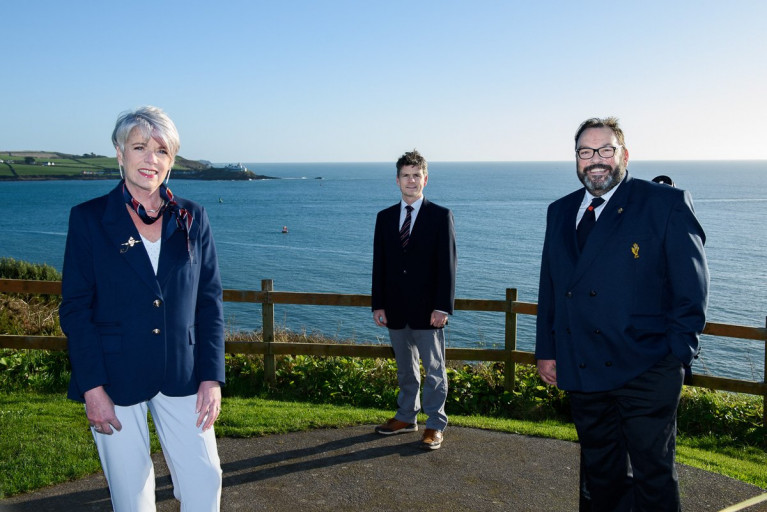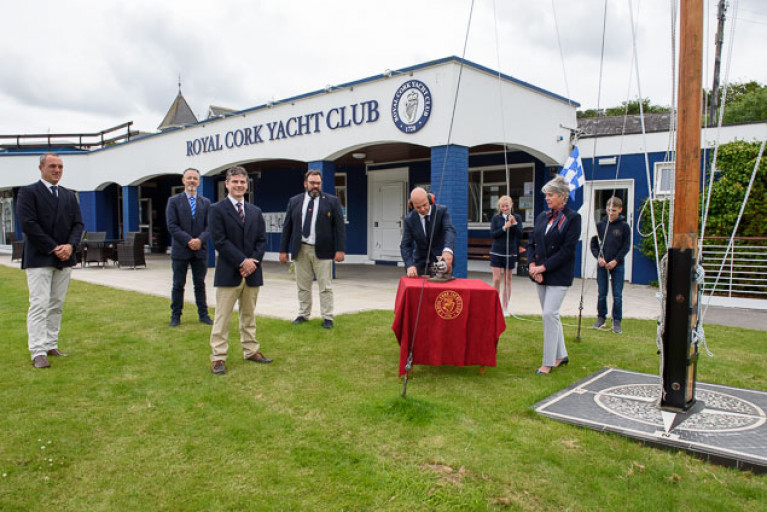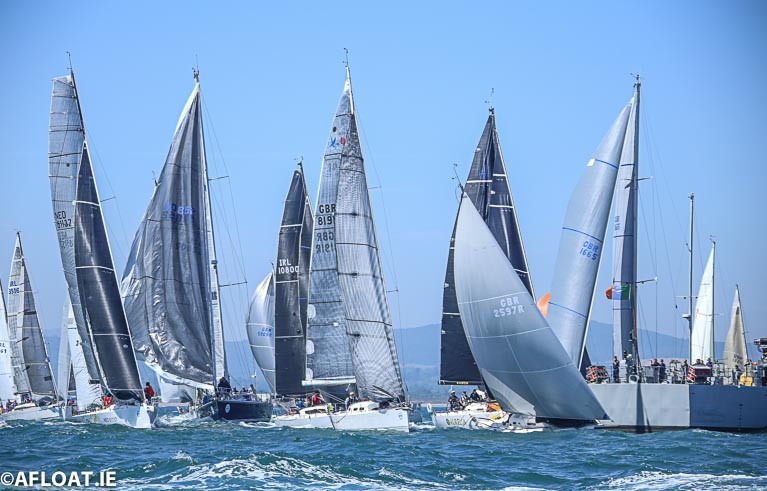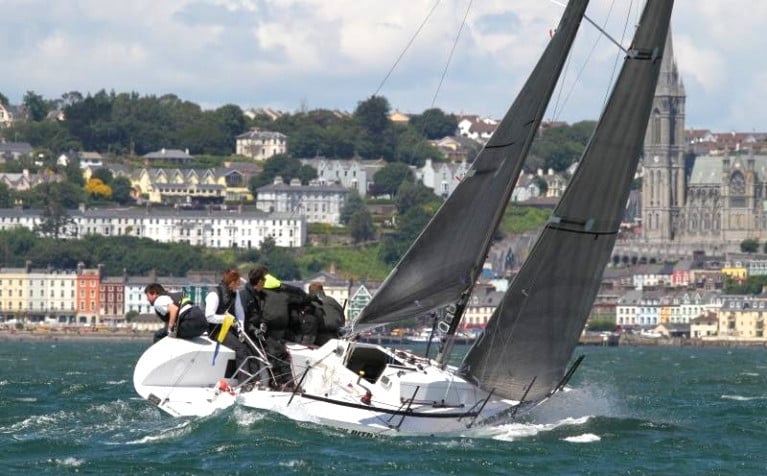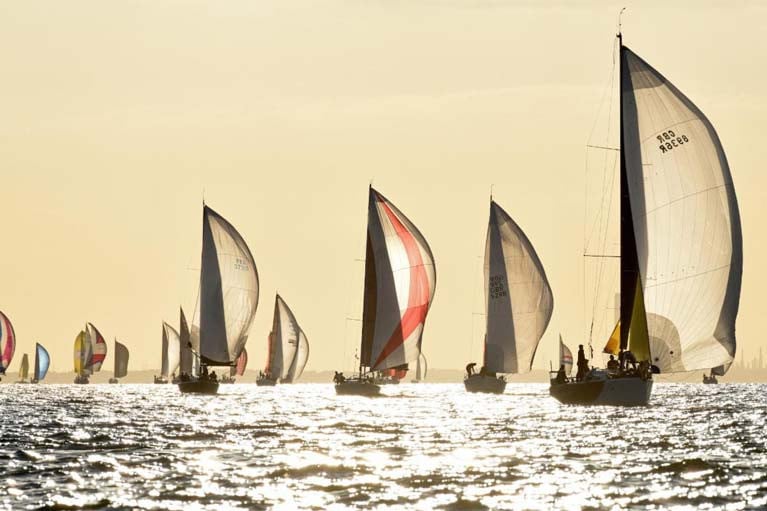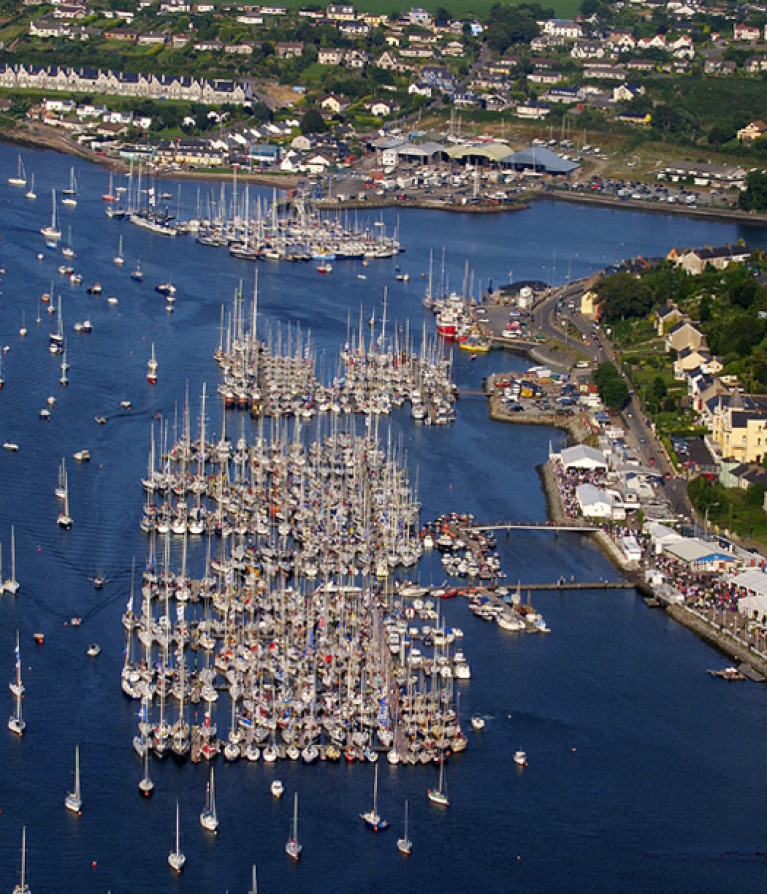Displaying items by tag: Cork Week
Half Model of 'Erin' is Presented to Royal Cork Yacht Club as Cork Week Classic Boat Plans are Revealed
Last week's club talk by Royal Cork Yacht Club helmsman Harold Cudmore on the exploits of the Cork Harbour One Design classic yacht Jap at St. Tropez in October gave details of the 1897-built yacht's recent performances on the continent but also revealed details of 2022 plans to bring a classic boat division to Cork Week Regatta next year.
As regular Afloat readers will recall, the restored Jap skippered by Cudmore and with a crew that counted club Admiral Colin Morehead among its number won Le Voile Saint Tropez Classic Regatta in the South of France.
In a great result for Cork Harbour classic boat enthusiasts, Royal Cork member Terry Birles and his yacht Erin took fifth in their class in St. Tropez too.
 Royal Cork member Terry Birles (left) with a half model of his yacht Erin and RCYC Admiral Colin Morehead Photo: Bob Bateman
Royal Cork member Terry Birles (left) with a half model of his yacht Erin and RCYC Admiral Colin Morehead Photo: Bob Bateman
During the club talk, Birles presented a half model of the classic yacht Erin for display at the Crosshaven clubhouse.
Details of Cork Week's Classic Division are to be announced at the Paris Boat Show on 4th December.
 Jap, built in Carrigaloe in 1897 and fully restored and sailing again (pictured here in Cork Harbour) as part of RCYC's 300th celebrations, took an unassailable lead in her class at the important classic regatta in October. Olympic helmsman Cudmore was on the tiller of the oldest and the smallest yacht at the classic yacht Centenary Trophy fleet in St. Tropez. Photo: Mary Malone
Jap, built in Carrigaloe in 1897 and fully restored and sailing again (pictured here in Cork Harbour) as part of RCYC's 300th celebrations, took an unassailable lead in her class at the important classic regatta in October. Olympic helmsman Cudmore was on the tiller of the oldest and the smallest yacht at the classic yacht Centenary Trophy fleet in St. Tropez. Photo: Mary Malone
Cork Week 2022 Boost with Early Register of 57 Boats
Cork Week Regatta at Royal Cork Yacht Club in Cork Harbour has received a 57 boat registration for its 2022 Regatta just a week after the booking system went live for its 300th-anniversary regatta rerun.
Royal Cork's Alex Barry says there is 'huge interest' with 30% of those are from the UK and interest registered from Spain, Germany, Hong Kong and France too.
As regular Afloat readers will know, Cork Week 2020 was one of the big COVID-19 casualties of Royal Cork's Tricentenary celebrations last year.
Barry says the 2022 fleet is showing great signs of diversity from a Gunboat 68 and Swan 62 to 2 x Fast 40s, 15 x 1720s.
In the IRC ratings, there are now "15 boats registered are over 1.000, seven boats under .900 and everything in between", he adds.
Royal Cork Yacht Club organisers have published an 'Advance Notice of Race' for the 2022 Cork Week regatta in Cork Harbour.
The Race Committee is planning another action-packed five days of racing for all classes across a variety of courses.
The ICRA National Championships and the 1720 European Championships are already signed up for the week that runs from July 11 to 15.
"We will welcome a diverse fleet to assemble from around the globe, everything from stately classics to the most modern race boats, and all can expect a warm Irish welcome and great racing at Cork Week", the organisers say.
Download the advance notice of race below as a jpeg file
'Registration of interest' is live here
The date for the Half Ton Classic Cup 2022 announced this week for Cowes following the cancellation of the 2021 event due to COVID-19 has changed its dates.
Inbox
The Cup will now be run from the 15-19th August 2022 to avoid an overlap with Cork Week 300.
Annamarie Fegan and Ross Deasy will co-chair Cork Week 2022, Royal Cork Yacht Club has announced.
Deasy who has raced as part of many RCYC keelboat campaigns in the last 25 years, including a Commodore’s Cup win onboard Antix, will chair Cork Week's racing committee. Fegan who has been campaigning the family Grand Soleil ’40 both inshore and offshore in recent years, including a win in this year’s inaugural Fastnet 450 Race, will chair the shore-side events.
As Afloat previously reported, the date has been set for Cork Week 2022 from Monday, July 11th to Friday, July 15th 2022.
With Volvo Cork Week 2020 having been cancelled as a result of the global pandemic, RCYC is extending its Tricentenary celebrations with a number of significant events in the coming years, including Cork Week 2022.
The 300th anniversary of the oldest yacht club in the world is a momentous occasion and the Royal Cork welcomes members, guests and visitors to join them for world-class racing and shore-side entertainment.
Cork Week organisers have committed to publishing an advanced notice of race by Easter 2021, thus giving boat owners and captains plenty of time to make plans to attend this very special event in Cork which organisers hope will achieve the 300+ boats expected for Volvo Cork Week 2022.
Honorary life member and former Admiral of the Royal Cork, Anthony O’Leary, joins the committee as an advisor for 2022.
The committee will be supported by Alex Barry in communications, General Manager of the Royal Cork, Gavin Deane, and Rear Admiral of Keelboat racing in the Royal Cork, Daragh Connolly.
At times of sadness, we are helped by ceremonial. For sure, no-one would dream of comparing the enormous grief visited upon those who have been and will be bereaved by COVID-19 with the quiet sense of loss caused the absolutely correct and timely decision to cancel Volvo Cork Week 2020. Yet it was to be the high point of the Club’s keenly-anticipated international Tricentennial celebrations. So at the beginning of the week in which it should all have been happening, something was needed to mark the moment, some small but poignant ceremonial to signal that the club and its members, while saddened by the cancellation, are capable of moving on, and are indeed moving on.
It happened at noon on Sunday. Key figures in the running of the club and the planning of the Tricentenary assembled in a small enough group on the club lawn to maintain social distance, and with them were two young Optimist sailors to symbolise the class whose National Championship at Crosshaven on August 13th to 16th will see the club return to national action after a month and more in which down-home club activity has been steadily building following the total Lockdown.
Daragh Connolly, Rear Admiral Keelboats, fired three cannon shots, and the Optimist sailors sent aloft the flags ’N’ over ‘A’ to signal that Volvo Cork Week 2020 was cancelled. It said everything that needed to be said. And then Admiral Colin Morehead and George Mills of Volvo Car agents Johnson & Perrott signalled the announcement that Volvo Cork Week 2022 will be staged from July 11th to 15th 2022. The Crosshaven tradition of superb events run ”by sailors, for sailors” is very much alive and well. And in the days and weeks ahead, the club will see a steady but measured continuing resumption of activities to mark the Tricentenary in a heartfelt yet subdued manner in keeping with the current circumstances.
 Long live Volvo Cork Week 2022. RCYC Admiral Colin Morehead and George Mills of Johnson & Perrot launch the future. Photo: Robert Bateman=
Long live Volvo Cork Week 2022. RCYC Admiral Colin Morehead and George Mills of Johnson & Perrot launch the future. Photo: Robert Bateman=
What To Do When The Sailing Season Seems to Collapse?
One-by-one they came in this week – cancellations of planned events. The Royal Cork’s 300th celebrations. I commiserated with the club’s Admiral, Colin Morehead. A tough decision for him in his first few months in office. Cork Week had to be abandoned. The Squib National Championships at Kinsale which, when I wrote last week’s column were still going ahead, were also cancelled as were many other planned events.
One of my favourites, the Classics at Glandore Harbour Yacht Club in West Cork, which I’ve sailed in several times, are set for July 18-24 and were to connect with the RCYC’s 300th.
Commodore, Eamon Timoney has told club members that GHYC is still committed to the Classic 2020 schedule but, things may change: “Our strategy is to plan for our various events, including the Classic Regatta until such time as a cancellation or postponement is required. The Committee will endeavour to do this in a timely way.”
Another of the major events in which I take particular interest and raced three times - the Round Ireland Yacht Race - is still set for Saturday, June 20. Wicklow Sailing Club says it will “make a call on whether or not to go ahead with the race towards the end of April.”
This weekend, my own club the RCYC closed its entire site including access to the marinas until Easter Sunday, April 12.
So what to do when the planned sailing season seems to collapse? My plan had been for installing some new electronics on Scribbler, my Sigma 33. I was looking forward to that, all planned when the crisis hit. Now she sits amongst many other boats in the boatyard as the sailing fraternity waits to see what will happen.
Upwind & Downwind Sailing
So I’ve been turning my mind to thoughts of that beautiful moment at the start of each season when Scribbler lifts to the first wave after she’s been launched and wondering when I will feel that moment this year.
In this frame of mind, I’ve been considering upwind and downwind sailing.
When I took up the sport I was told that upwind is “toughest and worst” as the boat and crew beat a course to reach the windward mark. When the sea is bouncy it sure is not pleasant. As a novice learner I was told that the reward came with “freeing sails” and “setting the spinnaker.”
How then to account for my feeling of anxiety and concern that seems to encase my thoughts when that forward-bearing cloth goes up. I’ve sailed on various boats with different owners and listened to the shouts of “sheet; no get the guy; no I said sheet in; for pity’s sake let it out, it’s going to twist….” Those instructions are not always couched in pleasant terms and more brusque and blunt words have been used.
I’ve ”flown the spinnaker” on yachts of my own and on other people’s, on boats of various sizes; in the Round Ireland; across the Atlantic in the Whitbread Round the World Race. My family crew love “getting the spinnaker up,” with obvious delight and a feeling of fulfilment when it fills and Scribbler pulls away with the power of the crinkling upfront sail…
So, is my view of spinnakers because my early experiences of cruisers, contrasted from an owner whose view was “best left at home in the attic,” or the enthusiast for having his multi-coloured spinnaker flying when, as we cruised on a nice day off Schull, sun shining, the water nicely flat, happy with a sandwich and a glass of wine when he announced he wanted the spinnaker up and one of my crewmates replied: “Oh no, just when we were all getting along so nicely…..”
Listen to the PODCAST below
Cork Week 2022: Royal Cork Yacht Club Sets the July Date
Cork Week 2022 will take place July 11 to 15, 2022 at the Royal Cork Yacht Club in Cork Harbour.
The new dates were released by RCYC Admiral Colin Morehead after the world's oldest yacht club was forced to cancel its 300th celebrations planned for July 2020 in the face of the Coronavirus pandemic.
Read all Afloat's Cork Week stories here
RORC 'Sympathetic' to Royal Cork Yacht Club Following Cork Week Tricentenary Cancellation
The Royal Ocean Racing Club (RORC) in London says it is 'especially sympathetic' to the Royal Cork Yacht Club concerning their Tricentenary Celebration cancellations in July.
As Afloat reported earlier, the Cork Week Regatta, the IRC European Championships, and many other activities have all been cancelled.
The oldest yacht club in the world announced today that they took this difficult decision in conjunction with their partners to safeguard the health of sailors, visitors, volunteers and the community at large, and to give certainty to those participants and visitors who had scheduled to come to Cork in July.
RORC's Morgan Cup race, scheduled for 8th July was to act as a feeder race for the Cork Tricentenary Celebrations, however, due to the cancellation, the course will no longer head to Ireland. At this stage, there is no planned replacement course, but it likely to finish in the vicinity of the Solent.
RORC Racing Manager Chris Stone commented: "We are in extraordinary times and making these decisions, whilst unavoidable due to the Coronavirus pandemic, has still been very hard at the beginning of an exciting season of races. There is a huge amount of planning that goes into every race we run, so we can sympathise with the Royal Cork Yacht Club who have been in the planning process for many years. We will continue to monitor the pandemic and keep those who race with us fully informed in good time about the next races in the RORC Season's Point Championship."
In line with the continued COVID-19 Government guidance, as well as advice from many of the host finishing clubs in Europe, the RORC has, with regret, had to cancel or change a number of its key events.
The Cervantes Trophy race from Cowes, Isle of Wight to Le Havre, France scheduled for the 8th May has been cancelled. Le Havre port remains closed and is unlikely to re-open until later in May or early June. Members of the SRH (Société des Régates du Havre) and volunteers for this race have turned their attention to weekly Virtual Regatta inshore racing and drinks over their racing WhatsApp group - (Thursday nights for anyone interested).
RORC's North Sea Race which starts from Royal Harwich Yacht Club and sails to the Dutch port of Scheveningen has also been cancelled. The race - which was due to start on 22nd May - has traditionally joined forces with Scheveningen Yacht Club's North Sea Regatta (the Vuurschepen Offshore Race) which was to celebrate its 75th regatta anniversary. Dutch authorities have currently closed the port, the Club, and limited recreation activities until 1st June.
RORC has also elected to cancel the Vice Admiral's Cup Regatta, scheduled for 15th-17th May. In recent years, this inshore regatta has enjoyed considerable growth and has become a 'must-do' event for one-design and specialist classes. With competitors needing to confirm details for the regatta, and with the RORC Cowes Club House being closed in line with Government guidelines, it was felt prudent and in the interest of all parties to cancel the event early.
A bumper 2020 Cork Week Regatta planned for July to celebrate Royal Cork Yacht Club's 300th birthday has been cancelled over the Covid-19 emergency.
All events scheduled in July for the Cork300 events series, which were to run across Cork Harbour to celebrate the Royal Cork Yacht Clubs 300th birthday, have been cancelled but RCYC are continuing planning now for August events.
The Club announced today that they took this difficult decision in conjunction with their partners to safeguard the health of sailors, visitors, volunteers and the community at large and to give certainty to those participants and visitors who had scheduled to come to Cork in July.
The celebrations scheduled to take place in July, which have now been cancelled, include Volvo Cork Week 2020 (in partnership with Johnson & Perrott), a Classic Yacht Regatta, a Cruise in Company with the Irish Cruising Club and other leading Cruising Clubs from America and Europe along the Wild Atlantic Way and a Royal Cork Fleet review and National and European yacht racing championships.
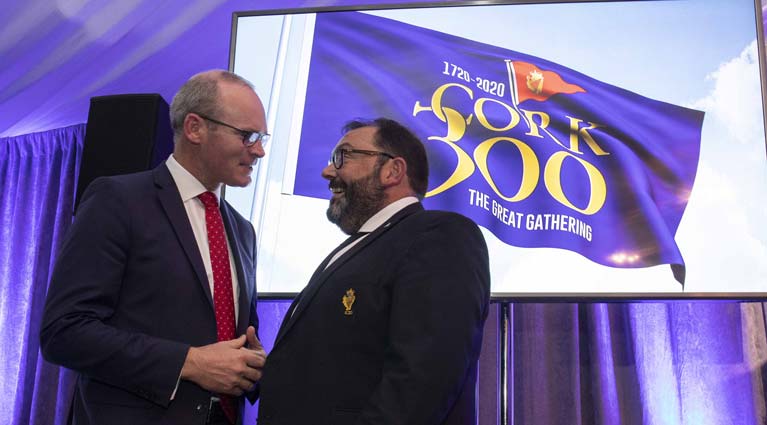 Tanaiste Simon Coveney (left) with Royal Cork Admiral Colin Morehead at the launch of Cork Week 2020 last September
Tanaiste Simon Coveney (left) with Royal Cork Admiral Colin Morehead at the launch of Cork Week 2020 last September
The Royal Cork are monitoring the ongoing Covid19 situation closely, but as of now, are continuing to plan for all of the remaining events scheduled from 1st August to end of December 2020.
Founded in 1720, the Royal Cork Yacht Club is the oldest yacht club in the world. As such, their special anniversary events were attracting National and International sailing communities to Cork from as far as Australia, Hong Kong and San Francisco who wanted to see “Where It All Began”.
Commenting, Chair of Cork300 and Admiral of the Royal Cork Yacht Club, Colin Morehead said, “It is with considerable regret and sadness that we have to cancel Volvo Cork Week 2020 and all other events throughout July. We are living in very uncertain times and the health of our members, our visitors, our city and country is now the main priority.”
“Over the last number of weeks, we have carefully monitored the developing global situation. We have taken continued guidance from Government Officials, the Health Service Executive, Irish Sailing and other experts in the hope that we would be able to proceed with our exciting schedule of events for July. We are very conscious that this decision will impact many visitors who have already booked to travel and participate and hope that making our decision at this stage will enable them to change their plans accordingly.”
"in the three hundred years since the foundation of the Royal Cork Yacht Club, we have faced many adversities"
“We are also very aware that this will be another blow to our local economy. However, in the three hundred years since the foundation of the Royal Cork Yacht Club, we have faced many adversities and are confident that working together, we will see the club, county, country and global sailing community come through these difficult times. Indeed we look forward to welcoming as many sailors as possible back to Cork Week in July 2022 ”
“I would like to thank our partners for their unwavering support – AIB (premier partner), Volvo Car Ireland (Cork Week title sponsor and Cork300 partner) our Foundation Partners the Port of Cork and Cork County Council and other Cork300 partners, Cork City Council, Heineken, Musto, Dubarry, and Doyle Shipping Group. Their support in recent weeks has been incredible. And to the voluntary committee and staff at the Royal Cork Yacht Club, along with supporting associations and clubs such as ICRA, RORC, Yacht Club de Monaco, Royal Yacht Squadron, Irish Cruising Association, Cruising Club of America and the Royal Cruising Club who have worked tirelessly over the past months and years to plan for the July events – my thanks.”
“Finally can I say that words cannot describe how thankful we all are for the hard work of everyone who is making significant sacrifices to keep us safe in these unprecedented times and to the sailing community, family and friends for your support as we navigate this uncertainty together – we truly value you, our community, more than ever.”
Also commenting, David Thomas, Managing Director Volvo Car Ireland said “Volvo Car Ireland are very proud of our long and successful association with Volvo Cork Week but fully support this difficult decision as being right for Cork, Ireland and the wider international sailing community. We hope that some of the planned events later in the year will still take place and will work closely with the Cork300 team and the Royal Cork Yacht Club around these future plans.”
"The ICRA board are now investigating the possibility of moving the 2020 National Championships"
Richard Colwell, ICRA Commodore commented, “ICRA fully support the RCYC team in their decision to cancel Volvo Cork Week incorporating the ICRA National Championships. It is a real shame that this hotly anticipated sailing event has fallen foul of the Coronavirus outbreak, but we fully understand the need to cancel, and we send our commiserations to the organising committee who have put so much hard work into an event that will not now run. The ICRA board are now investigating the possibility of moving the 2020 National Championships, to form part of an event which may still hopefully be held later in the year, and will announce more on this in the coming week.”




























